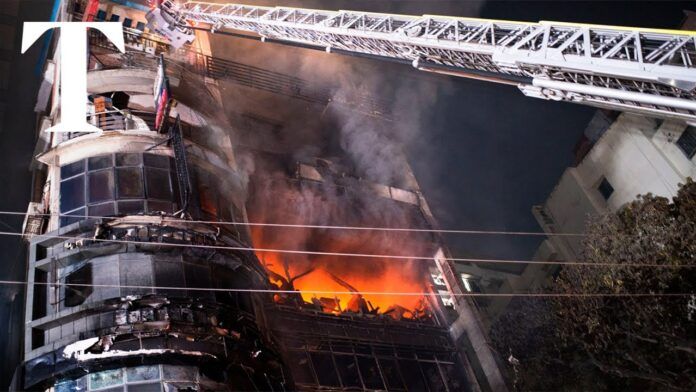A late-night blaze in Bangladesh’s capital raises concerns over fire safety and working condition
In a tragic incident late Thursday night, a fire engulfed a shopping mall in Dhaka, Bangladesh, resulting in at least 46 fatalities and leaving dozens injured, many in critical condition. The fire, which officials say was caused by carbon monoxide poisoning from smoke inhalation, highlights the persistent issues of fire safety and industrial disasters in the country.
The Incident
The blaze broke out around 9:51 p.m. on the mall’s second floor, quickly spreading through the seven-story building. Witnesses reported a lack of adequate emergency exits, with some individuals trapped inside resorting to jumping from higher floors to escape. The fire officials pointed out that the mall, a blend of eateries and stores, housed gas cylinders on almost every floor, potentially contributing to the rapid spread of the fire.
Response and Recovery
Firefighting crews battled the flames for over two hours before extinguishing the fire. The aftermath left the shopping mall, a popular spot in Dhaka’s Bailey Road, a burned-out husk. Videos from the scene showed the charred remains of the floors and the rescue efforts to save those trapped inside. Dhaka Metropolitan Police have initiated an investigation, utilizing drones to assess the damage and direct the recovery efforts.
Historical Context
Bangladesh, a country of 170 million, has seen its share of deadly fires and industrial disasters, especially in garment factories. Despite significant economic growth, these incidents underscore the ongoing challenges related to workplace safety and labour conditions. The 2013 collapse of an eight-story garment factory, which claimed over 1,100 lives, remains the worst of such disasters in recent memory.
The tragedy at the Dhaka shopping mall calls for a renewed focus on improving fire safety standards and working conditions in Bangladesh. As the community mourns the loss of life and begins the process of healing, there is a pressing need for actionable steps to prevent future incidents of this nature
